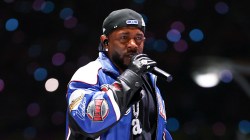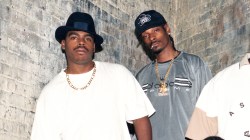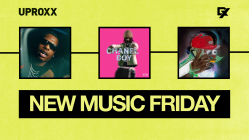When New York drill first emerged, its sound was predominantly dark and foreboding, an almost futuristic blend of Chicago-style intensity and wonky UK grime beats. But in the years since the rise of Pop Smoke and Fivio Foreign, drill has become something more fluid and mutable. As with “trap” a decade ago, “drill” seems to have become more of a short-hand for a certain kind of drum pattern and delivery more than a descriptor of one single vibe or style. Even if his flow is still gruff and intense, there’s a deliberate absurdity to an artist like Shawny Binladen, the standard-bearer of the sample drill movement. The self-described “King of Samples” first gained traction for his furious flows over ridiculous flips — like the Grinch he so often compares himself to, Shawny has gleefully tip-toed over everything from “Georgia On My Mind” to Journey to Gunna.
But such prolific sampling comes with costs: legally and financially, of course, but also critically. With radio airwaves flooded more than ever with big-budget pop tracks prefabricated from nostalgia-baiting samples and easy-mode interpolations, an artist like Shawny risks being treated as a novelty, his use of recognizable samples perceived not as a purposeful creative choice but flashy audio clickbait. The difference, of course, is that Yung Gravy’s “(Betty) Get Money” or Jack Harlow’s “First Class” are money-making ventures for the sample rights holders as much as the artist rapping over the sample (at least in Harlow’s case as Gravy works to settle a pending lawsuit). Shawny Binladen, like the BabyTron of Queens, is a copyright Robin Hood, who compliments his tales of less-than-legal exploits with unsanctioned flips that thumb their nose at authority through their existence on digital streaming platforms.
With his new album WiCKMAN STiCKMAN, Shawny Binladen sets out to deliberately prove himself more than a gimmick. As a project, it’s similar in some respects to RXK Nephew’s recent Till I’m Dead, which also aimed to translate an outsider artist’s cult appeal to a more playlist-friendly sound, without deliberately selling out or switching to a pop style. There are certainly samples buried within beats by collaborators like Natt Carlos and Chubby El Hefe, but none of the bold, middle-finger flips that defined his earlier projects.
If the engine and gears of Shawny’s beats have been swapped out, the framework is still the same. More than any sample, his sound is built off bone-rattling bass and off-kilter percussion—like Shawny’s flow, the drums on his songs are restless and unpredictable, like they’re running away from a daunting figure in the distance. Every verse is a sprint, delivered in rapid staccato bursts, the beat and delivery egging one another on. Shawny’s distinct whisper flow gives his music an unexpected intimacy, like he’s confiding illicit secrets in the ears of his inner circle. Even if he spits with a relentless pitter-patter flow, Shawny’s gravelly indoor voice recalls Drakeo the Ruler as much as any New York rapper. But just when you think you’ve got Shawny pegged, he flips the formula just as easily as he turns samples on their head; “HATE DATT” switches up the tempo, unleashing the energy of a rave as Shawny smoothly glides over a phonk-like club beat
Shawny’s love of distorted vocal samples often suggest the influence of producers like Clams Casino and Friendzone. There’s a cloud rap-like ethereality to much of WiCKMAN STiCKMAN’s sonic palette; on “ANGEL,” Shawny and FOUR50 receive backup from a ghostly chorus of pitch-shifted voices. The woozy synthesizers on “THE REAPER” sound like a cassette tape breaking down in the deck, all glitchy and flanged out. Glittering bells give tracks like “TLC” and “INDEPENDENT” an unexpected sense of whimsy, a sparkling glimmer piercing through the concrete. “LARRY LOBSTER” suggests the sci-fi production of Pi’erre Bourne, while “ON GOD” offers a more reflective mood with gentle piano and plunky MIDI strings straight out of a Nintendo game.
WiCKMAN STiCKMAN might give Shawny Binladen’s music a more respectable coat of paint, but he’s far from selling out; there’s no desperate co-signs or clout-chasing features, with the only guest verses supplied by Grinchset comrades Big Yaya and FOUR50. Though it might lack the inherent illicitness of his early projects, WiCKMAN STiCKMAN hasn’t sacrificed any of the the edge or intensity, proving that Shawny Binladen isn’t just riding samples to success. His slithering flow is enough to stand on its own, as unpredictable and inventive as any sample he’s ever spit over. If the copyright goons can’t keep Shawny Binladen down, there’s not much standing in his way to become the king of sample drill.




![50 Cent Shares Unseen Diddy Footage From Netflix Documentary: "[It] Shows You His Character"](https://hiphopdx.com/wp-content/uploads/2025/12/50-cent-diddy-documentary-trailer-unseen-footage.jpg?w=250)





